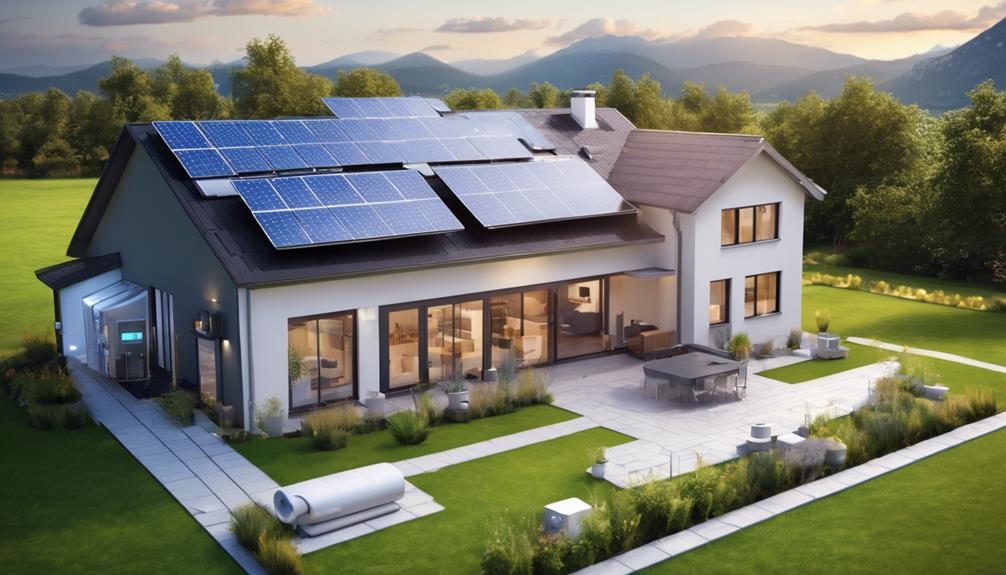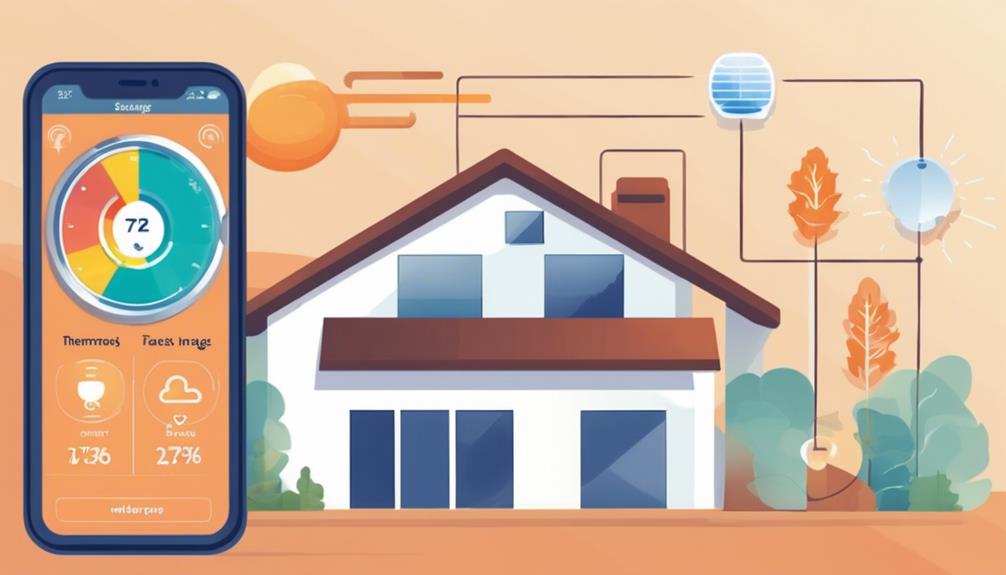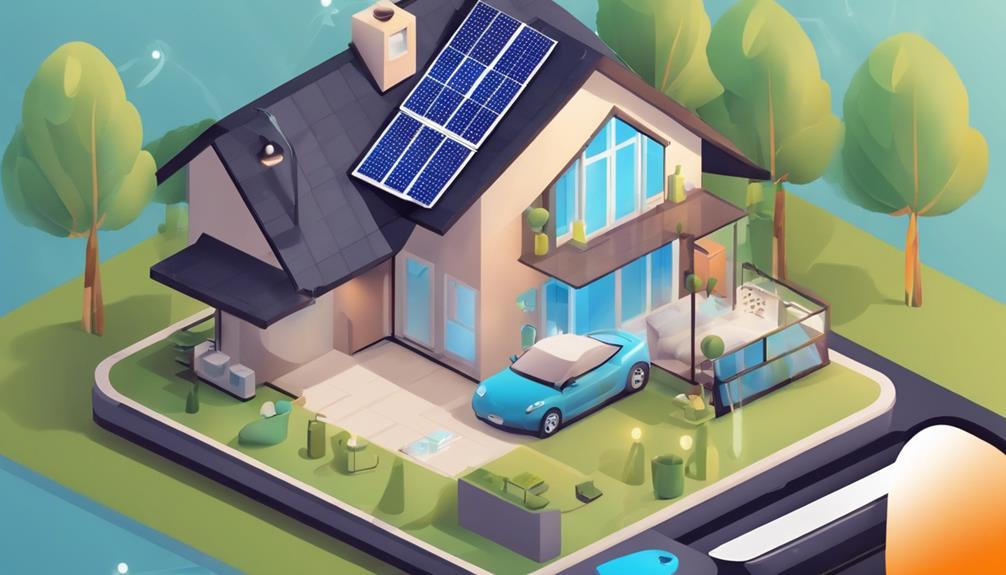Achieve maximum energy efficiency by utilizing smart home energy insights and management solutions. Gain real-time monitoring, remote control capabilities, and predictive maintenance features for informed decisions on consumption. Integration with renewable sources like solar power and wind turbines guarantees sustainable energy usage. Cost-effective strategies utilizing smart thermostats, ENERGY STAR products, and behavioral analysis can decrease energy bills considerably. By optimizing energy use, integrating with smart appliances, and leveraging real-time data visualization tools, you can enhance efficiency by up to 30%. Embrace smarter energy management for a greener, more cost-effective lifestyle. Tap into the full potential of your energy management system.
Key Takeaways
- Real-time tracking of electricity and gas consumption for informed decisions.
- Integration with smart meters for detailed insights into consumption patterns.
- Optimization strategies like smart thermostats for up to 30% savings.
- Efficient renewable energy sources like solar power and wind turbines.
- Smart home systems for energy efficiency and personalized recommendations.
Energy Monitoring and Control Solutions
Energy monitoring and control solutions offer homeowners the ability to track and manage their electricity and gas consumption in real-time, providing valuable insights for optimizing energy efficiency. Real-time monitoring allows you to see exactly how much energy your household is using at any given moment, empowering you to make informed decisions to reduce waste. Additionally, with remote control capabilities, you can adjust settings and turn off devices even when you're not at home, ensuring that energy is not being needlessly consumed. Integration with smart meters further enhances this capability by providing detailed insights into your energy consumption patterns, enabling you to identify areas where you can make changes to save energy and money. Predictive maintenance features also help you stay ahead of potential energy inefficiencies, allowing you to address issues before they escalate and lead to increased energy usage. By utilizing these energy monitoring and control solutions, you can take charge of your energy usage and work towards a more efficient and cost-effective home.
Cost-Effective Energy Optimization Strategies
To effectively optimize energy usage in smart homes and achieve significant cost savings, implementing efficient strategies is vital. Energy saving tips can include using ENERGY STAR certified products, which not only contribute to energy savings but also help in reducing greenhouse gas emissions. Additionally, budget-friendly solutions such as smart thermostats and smart plugs can play an important role in optimizing energy usage based on your habits and preferences. These devices allow you to remotely control and monitor your energy consumption, providing added convenience for homeowners. By incorporating these cost-effective energy optimization strategies, smart homes can potentially reduce energy bills by up to 30%. Smart home energy management systems are increasingly popular for their ability to reduce energy consumption and increase efficiency, making them a wise investment for those looking to save on energy costs in the long run.
Integrating Renewable Energy Sources

How can renewable energy sources like solar and wind power be effectively integrated into smart home systems to enhance energy management and sustainability? Integrating renewable energy sources into smart homes offers numerous benefits for both homeowners and the environment. Solar power, in particular, is a popular choice due to its ability to efficiently harness energy from the sun. The affordability and accessibility of solar energy for smart homes are increasing, making it a viable option for many households looking to reduce their carbon footprint.
Additionally, wind turbines can also play a significant role in generating clean electricity to power smart home energy solutions. By incorporating these renewable energy sources, smart homes can promote a greener and more sustainable energy consumption model. This integration not only reduces reliance on fossil fuels but also contributes to a more environmentally friendly lifestyle. Seizing the smart home integration opportunities provided by renewable energy sources is a proactive step towards achieving energy efficiency and sustainability in modern households.
Efficiency Through Smart Home Systems
In addition, utilizing smart home systems can greatly enhance efficiency in managing household energy consumption. These systems enable homeowners to optimize energy use, leading to potential savings of up to 30% on energy bills. By integrating with smart appliances such as thermostats and lighting systems, precise control and automation of energy usage become achievable. Real-time data visualization tools offered by these systems allow for insights into energy consumption patterns, aiding in the efficient scheduling of energy-intensive tasks. Energy efficiency trends indicate a shift towards smarter energy management solutions that empower users to make informed decisions. Moreover, future advancements may see the integration of artificial intelligence for predictive energy management and optimization, further improving overall home energy efficiency. Embracing smart home energy insights not only enhances sustainability but also contributes to a more energy-efficient and cost-effective household.
Maximizing Energy Savings Solutions

Maximizing energy savings solutions through smart home energy insights and management involves implementing tailored strategies to optimize energy consumption efficiently. By leveraging behavioral analysis, smart home systems can track your energy usage patterns and identify areas where energy is being wasted. These insights enable the system to provide personalized recommendations on how you can adjust your energy usage to maximize savings.
Through personalized recommendations, smart home energy management solutions can suggest specific actions such as adjusting thermostat settings, optimizing appliance usage schedules, or even recommending energy-efficient upgrades. These tailored suggestions cater to your unique energy consumption habits, ensuring that you achieve the maximum possible energy savings without sacrificing comfort or convenience.
With the potential to reduce energy bills by up to 30%, incorporating behavioral analysis and personalized recommendations into your home energy management strategy can lead to significant cost savings over time. By embracing these smart solutions, you empower yourself to take control of your energy usage and make informed decisions that benefit both your wallet and the environment.
Frequently Asked Questions
Can Smart Home Energy Systems Detect Appliance Malfunctions?
Yes, smart home energy systems can deftly detect appliance malfunctions through meticulous Appliance diagnostics. By analyzing Energy efficiency patterns, these systems can swiftly pinpoint abnormalities in energy consumption, indicating potential issues with appliances. Such insights can prompt timely interventions, preventing costly repairs or replacements. With alerts for irregular energy consumption, smart home systems empower you to proactively address appliance malfunctions, ensuring efficient energy usage and appliance longevity.
How Can I Ensure Data Privacy With Energy Monitoring?
To guarantee data privacy with energy monitoring, prioritize privacy protection through encryption protocols. Secure user consent for data sharing and implement robust encryption techniques to safeguard sensitive information. Regularly update security measures and monitor data access to prevent unauthorized breaches. Opt for reputable service providers with strong privacy policies to enhance data security and protect your personal information from potential threats.
Are There Incentives for Integrating Renewable Energy Sources?
When it comes to integrating renewable energy sources like solar panels, you're in luck with government subsidies. Financial incentives such as tax credits, rebates, and grants are available in various locations. Installing solar panels can lead to significant savings and even earn you credits through net metering programs. With the right incentives, you can offset a substantial portion of the initial costs, making renewable energy integration more accessible and cost-effective for you.
What Are the Potential Risks of Smart Home Energy Systems?
When considering smart home energy systems, potential risks include cybersecurity threats that expose personal data and compromise home security. Unintended consequences may arise from integration issues with existing appliances, leading to compatibility problems and reduced system effectiveness. Additionally, dependence on internet connectivity can result in disruptions during network outages. These risks, combined with high installation costs and lack of standardization, may hinder the adoption of smart home energy solutions.
Can Smart Home Systems Adapt to Seasonal Energy Patterns?
Yes, smart home systems can adapt to seasonal energy patterns by analyzing historical data to optimize energy consumption. Seasonal adjustments are made to heating and cooling settings based on energy consumption patterns. These systems learn user preferences and adjust accordingly to align with seasonal demands. By incorporating weather forecasts, energy needs are anticipated, ensuring proactive adjustments for peak energy efficiency throughout the year.
